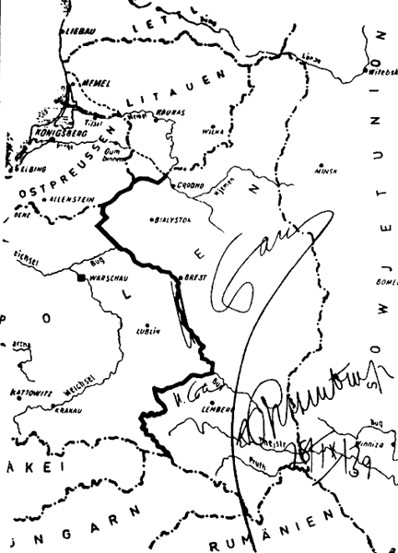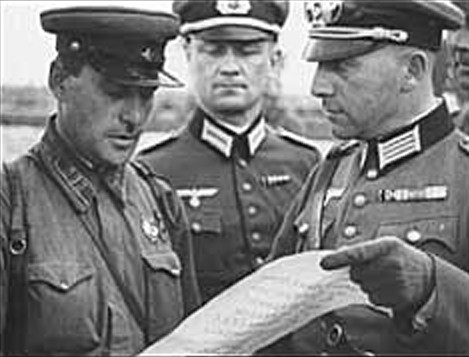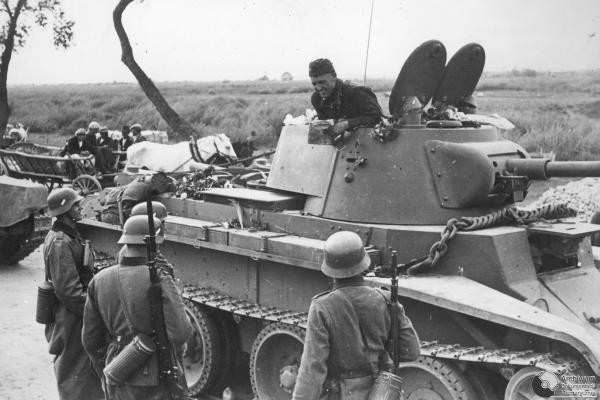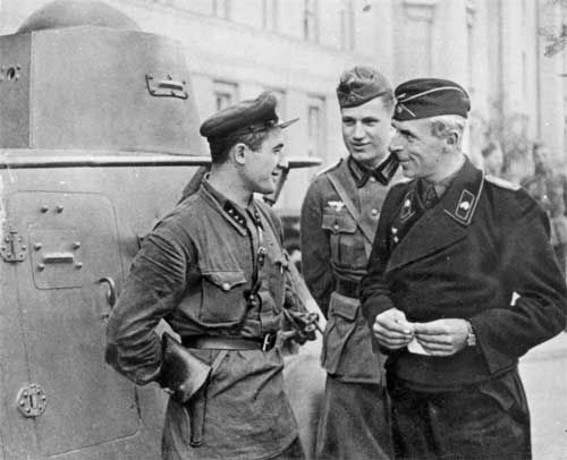Molotov-Ribbentrop Pact
Molotov-Ribbentrop Pact. The popular name of the German-Soviet Nonaggression Pact signed in Moscow on 23 August 1939 by the foreign ministers of the Union of Soviet Socialist Republics (Viacheslav Molotov) and Nazi Germany (Joachim von Ribbentrop). The pact was signed immediately after the agreement of 19 August, which granted the USSR 180 million marks for the purchase of German goods. It followed months of unsuccessful negotiations between the USSR on the one side and France and Great Britain on the other, and Soviet failure to organize an anti-Nazi diplomatic coalition.
The Molotov-Ribbentrop Pact was one of the most important diplomatic acts in Soviet history. Its formal section, consisting of seven articles, was made public. It specified that the signatories would refrain from aggression against each other, remain neutral in case of war with other states, exchange information, and resolve disputes peacefully. The pact was to remain in force for 10 years. A secret protocol of four articles which was appended to the formal part divided Poland between Germany and the USSR along the Sian River–Buh River–Narev River (roughly following the Curzon Line) and thereby handed over most of the Polish-ruled Ukrainian and Belarusian territory to the USSR and assigned Latvia, Estonia, Finland, and Bessarabia to the Soviet sphere of influence and Lithuania to the German sphere. An adjustment on 28 September 1939 transferred Lithuania to the Soviet sphere of influence and redrew the border along the Sian–Buh–Narva rivers, to remove some ethnically Polish territory from the Soviet part.
This pact led directly to the Second World War. Fearing that Great Britain and France would honor their treaty obligations to Poland and come to its defense, Adolf Hitler needed a guarantee of Soviet neutrality before he could launch his assault on Poland, for he believed that Germany could not fight on two fronts simultaneously. On 1 September Germany attacked Poland, and on 3 September Britain and France declared war. The USSR invaded Poland from the east on 17 September and occupied the territory assigned to it in the secret protocol. Joseph Stalin justified the action by citing the need to guarantee the safety of the millions of Ukrainians and Belarusians in eastern Poland. Rigged elections were quickly held, and on 27 October 1939 the new National Assembly of Western Ukraine formally proclaimed Soviet rule and petitioned the USSR to incorporate the territory into Soviet Ukraine. The ‘request’ was granted on 1 November.
The Baltic states were forced to sign mutual assistance pacts with the USSR, which gradually expanded its influence in their affairs. The Red Army occupied the countries on 15–16 June 1940. As in Western Ukraine, the quickly ‘elected’ assemblies ‘applied’ in August 1940 to become Soviet republics. In June 1940 the USSR occupied Bessarabia and northern Bukovyna in the name of ‘national liberation.’
The Ukrainian question was an important factor behind the Molotov-Ribbentrop Pact. Stalin was concerned about a possible alliance between Germany and Western Ukrainian nationalists, who wanted to liberate Ukraine from Soviet rule. He probably feared that the short-lived independent Carpatho-Ukraine would serve as an inspiration to Ukrainians in the USSR. Hence, Stalin aimed to bring all Ukrainians under his rule in order to control them. He also knew that the Famine-Genocide of 1932–3 and terror of the 1930s had alienated the Ukrainian people from his regime, and that they would welcome a German invasion. Hence, he needed Germany's friendship or, at least, its neutrality.
The Molotov-Ribbentrop Pact remained the foundation of Soviet-German relations throughout the first years of the war. Joseph Stalin continued to abide by its provisions for co-operation and mutual support. He provided the Germans with much-needed raw materials for their war effort, even as Germany prepared for its invasion of the USSR. The pact entailed a radical change in Soviet foreign policy: the USSR abandoned its criticism of the Nazis and forced the Comintern and its communist allies in Western Europe and elsewhere to do likewise. This about-face greatly undermined the popularity of many communist parties outside the USSR. In Canada the government suppressed pro-Soviet organizations, such as the Ukrainian Labour-Farmer Temple Association. It was only the German invasion in June 1941 that put an end to the pact.
For most of the postwar period the official Soviet justification for the Molotov-Ribbentrop Pact was that the USSR needed time to prepare for a war with Germany. Until the late 1980s the Soviet authorities never even admitted the existence of the secret protocol, but stubbornly maintained that the Red Army had occupied Western Ukraine, Belarus, and the Baltic states in response to calls for assistance and protection. A major re-evaluation of the entire Soviet diplomatic record and especially of the pact has begun.
BIBLIOGRAPHY
Ulam, B. Expansion and Coexistence: The History of Soviet Foreign Policy, 1917–67 (New York–Washington 1968)
Read, A.; Fischer, D. The Deadly Embrace: Hitler, Stalin, and the Nazi-Soviet Pact, 1939–1941 (New York–London 1988)
Kolasky, J. Partners in Tyranny: The Nazi-Soviet Nonaggression Pact, August 23, 1939 (Toronto 1990)
Boris Balan
[This article originally appeared in the Encyclopedia of Ukraine, vol. 3 (1993).]





.jpg)